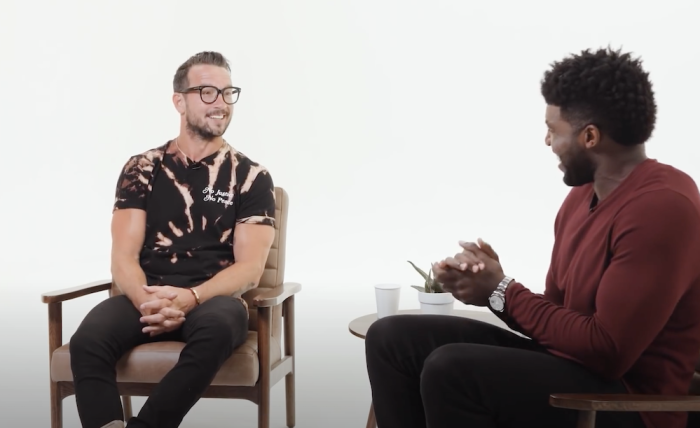Pastor Carl Lentz: ‘Churches might be one of biggest propagators of racist ideology’

Carl Lentz, lead pastor of Hillsong East Coast, appeared on the latest episode of "Uncomfortable Conversations With a Black Man" to speak on how he believes the American Church has been complicit in racism and how to better reflect Jesus moving forward.
"Now historically speaking, the most powerful person in America is a religious white man. Well, more specifically … the Christian, white man,” NFL linebacker Emmanuel Acho, who's now an ESPN analyst, said at the top of his show.
"I know that America we are religious people, generally speaking, and religion, it teaches you compassion, it teaches you empathy, it teaches you sympathy. But I recently read that compassion without confrontation is like fruitless, sentimental commiseration.”
The quote inspired Acho to have an uncomfortable but “compassionate confrontation” with the popular Hillsong pastor. He noted that although segregation in America was outlawed in the mid-1960s, Sunday mornings in houses of worship across America still remain segregated.
"It's hard to listen to a preacher preach if you know that that preacher believes in systems that are hurting your people,” Lentz said. “So it's safer sometimes to go to a black church ... [because] I don't know if I can trust somebody who claims to love Jesus and professes to teach me about this man yet you're silent on issues that hurt my people.’”
When asked why Lentz believes white pastors have not been outspoken on the matter, the minister used the example of an extremely dirty house.
“I'll just let my house be dirty because it's too much work. This is what happens with racism,” Lentz said in the episode.
"The moment you start looking into this, you realize, ‘Oh, wow, this goes all the way to the top. This is in our church choir. This is in our church administration. This is in the way we've taught the Bible. And there are a lot of Christians who set out to clean house until they find out how close to home it might come.”
“For decades in the American Church,” people have stuffed the problem of racism away, he said.
"I think, in fact, it could be said that churches might be one of the biggest propagators of racist ideology in our country.”
“There's a difference between your principle and your practical. So if my principle at Hillsong, New York City, is 'we value all people,' practically speaking, you should be able to see that,” he continued.
However, Lentz admitted that he too has been part of the problem.
"I asked myself that question (are you part of the problem or solution) when George Floyd was murdered, and my answer was, 'I'm more a part of the problem than I am the solution.' In that second, you're faced with a life-defining decision of going, do you put your arms up? Or do you look in the mirror and say, ‘I never want to be able to say that about myself again,” Lentz confessed.
"My stance, it comes from the Old Testament, where God says ‘I want justice, oceans of it.’ So unless I am a part of the oceans of justice team, I’m not doing enough. I’m a part of the problem. Now I can say I’m a part of the solution."
The father of three said he has been making practical changes, including teaching his children about racism.
"Teach what you know, even if it's 'son, I might have some racist stuff from the way I was brought up but me and you are on this journey together,’” Lentz illustrated. “That seed in the life of a child has more impact than any parent could ever know.”
Getting "real" with the pastor, Acho expressed his frustration with Christians and other religious persons who say such things as "it’s not about race, it’s about grace" and "it’s not about skin, it’s about sin."
But Acho argued that it is about skin and race "because race and skin is what is being punished and executed on camera in America right now."
In response, Lentz said that as powerful white people, "we've been allowed to say ignorant things" and "nobody said anything."
During the exchange, Acho and Lentz also talked about white power and privilege and what Jesus would do if He walked the earth today.
"There's no question where Jesus would be. Where did you find Him when we have record of Him? Who was He with? Who was He angering is more important?” Lentz said. “Jesus was loathed by the religious community for what? Proximity. He was at the dinner table, He was at the wrong parties, He was hanging out with the wrong people. He was talking to women when they weren't even allowed or even acknowledged as real humans.
“So if you had to wonder where Jesus would be, you got to go back to your Bible because He's where hurting people are.”
"The problem with American Christianity is we think Jesus said 'blessed are the peacekeepers.' He said 'blessed are the peacemakers.' This difference here is the divide in our country,” he added. “We're here to make peace. That means what do you have to do? You have to go find war, you have to find trouble, you have to find the hurting in order to bridge this gap.”
Lentz believes there is “hope on the horizon” but the least the Church has to do first is “say something.”




























